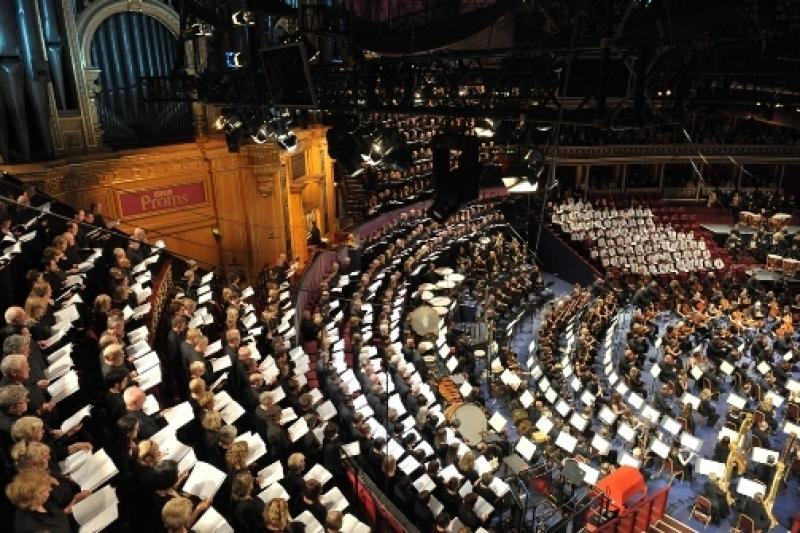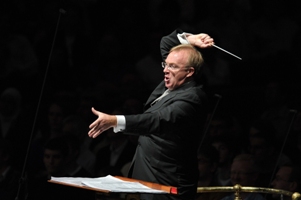BBC Proms: Havergal Brian's 'Gothic' Symphony, BBC Concert Orchestra, BBCNOW, Brabbins | reviews, news & interviews
BBC Proms: Havergal Brian's 'Gothic' Symphony, BBC Concert Orchestra, BBCNOW, Brabbins
BBC Proms: Havergal Brian's 'Gothic' Symphony, BBC Concert Orchestra, BBCNOW, Brabbins
Big, long and very short on great ideas: a monsterpiece well done, but to what end?

From Middle-earth, middle England and Nibelheim they came, adventurers anxious to acclaim an Unjustly Neglected British Masterpiece. Praise, or curse, their persistence in steering the BBC and the Albert Hall back to Havergal Brian's biggest work after 31 years; hail by all means conductor Martyn Brabbins's flexible command of nine choirs and two orchestras.
Leviathan-like length and size shouldn't get in the way of quality, provided you have brilliant ideas to fill the spaces, as Mahler always did. Brian, at least in the 1920s when he composed this epic, seems to have commanded only hollow gestures and an eclecticism that never goes quite far enough. The Gothic Symphony often feels like the work of a hyperactive child let loose on those famous Hollywood drawers of mood music for films marked "holy", "fearful", "peaceful", "stormy" and pasting the results together any old how. I've nothing against the kind of anti-symphonic thinking which traffics in far-flung contrasts: last year Rued Langgaard's Music of the Spheres did just that. But the quality of Langgaard's invention through all the peaks and troughs held my imagination spellbound; here I fidgeted and sniggered like a naughty schoolboy at the back of my box - and I didn't go into the hall intending to behave like that.
It may well be that once you get to know the music, it feels - as Brabbins described it in interview - like Brian is creatively wrong-footing the listener, heading off in weird and wonderful directions. Given the first-time immediacy of the experience - which is all most of us are going to get - it just seemed for the most part like a terrible, inchoate mess. While the outer movements of each of the two parts at least kept us listening for the occasional moments of celestial refinement between the thrashes, the centrepieces felt nightmarishly turgid - which is part of the point, surely, post-World War One, but again we all need footholds. It didn't help that the vast choral forces kept sagging in pitch - at one point angelically redeemed by distant soprano Susan Gritton - or that, once past an opening which sounded like a crumpled version of Elgar in angry mood, you kept noticing how Brian over-employs xylophones in excelsis and tubas at the bottom of the pile.
 The ever-underrated Brabbins (pictured right) kept his usual focus and drive through even the most preposterous flails and twiddles, but it was hard not to wish him better (say with a work like Janáček's Glagolitic Mass, heard on the First Night of the Proms, a masterpiece premiered in the same year as the Gothic's completion, 1927; any one of its ideas in this context would have had me sitting bolt upright). Likewise the quartet of soloists, whom you'd have been happy to encounter in Beethoven's Ninth. Italianate tenor Peter Auty and stalwart bass Alastair Miles did what they could to stand guard at either end of the endless sixth-movement ramble; for the second time in two days a mezzo - in this case the admirable Christine Rice, who deserves to shine - drew the short straw in terms of what the composer had given her to sing.
The ever-underrated Brabbins (pictured right) kept his usual focus and drive through even the most preposterous flails and twiddles, but it was hard not to wish him better (say with a work like Janáček's Glagolitic Mass, heard on the First Night of the Proms, a masterpiece premiered in the same year as the Gothic's completion, 1927; any one of its ideas in this context would have had me sitting bolt upright). Likewise the quartet of soloists, whom you'd have been happy to encounter in Beethoven's Ninth. Italianate tenor Peter Auty and stalwart bass Alastair Miles did what they could to stand guard at either end of the endless sixth-movement ramble; for the second time in two days a mezzo - in this case the admirable Christine Rice, who deserves to shine - drew the short straw in terms of what the composer had given her to sing.
Spatial effects made for visual as well as aural spectacle, with children's choirs, timps and extra brass taking up the side rows of stalls where the punters usually sit; but for me there was more magic in the two brief horn calls from the gallery in the previous night's concert performance of Rossini's William Tell than in anything on offer here. The choirs could have done with a stronger backbone of male voices - some senior tenors stood out unflatteringly - but did keep us company with comforting full-throttle triads and unexpectedly electrified in a sudden blaze getting over the final hurdle, where, with a pointedly banal little march leading the way, Brian showed originality in idea as well as scope. But it was a bit late by then. "Whoever strives with all his might/ Him can we redeem" run the lines from Goethe's Faust which Brian engaged as an epigram to the initial conflict. With art over decades, unfortunately, that's not enough. Is it time to put out a recording of this vivid performance to satisfy the enthusiasts, and lay "the Gothic" to rest forever now?
Share this article
Add comment
The future of Arts Journalism
You can stop theartsdesk.com closing!
We urgently need financing to survive. Our fundraising drive has thus far raised £49,000 but we need to reach £100,000 or we will be forced to close. Please contribute here: https://gofund.me/c3f6033d
And if you can forward this information to anyone who might assist, we’d be grateful.

Subscribe to theartsdesk.com
Thank you for continuing to read our work on theartsdesk.com. For unlimited access to every article in its entirety, including our archive of more than 15,000 pieces, we're asking for £5 per month or £40 per year. We feel it's a very good deal, and hope you do too.
To take a subscription now simply click here.
And if you're looking for that extra gift for a friend or family member, why not treat them to a theartsdesk.com gift subscription?
more Classical music
 Anja Mittermüller, Richard Fu, Wigmore Hall review - a glorious hall debut
The Austrian mezzo shines - at the age of 22
Anja Mittermüller, Richard Fu, Wigmore Hall review - a glorious hall debut
The Austrian mezzo shines - at the age of 22
 First Person: clarinettist Oliver Pashley on the new horizons of The Hermes Experiment's latest album
Compositions by members of this unusual quartet feature for the first time
First Person: clarinettist Oliver Pashley on the new horizons of The Hermes Experiment's latest album
Compositions by members of this unusual quartet feature for the first time
 Gesualdo Passione, Les Arts Florissants, Amala Dior Company, Barbican review - inspired collaboration excavates the music's humanity
At times it was like watching an anarchic religious procession
Gesualdo Passione, Les Arts Florissants, Amala Dior Company, Barbican review - inspired collaboration excavates the music's humanity
At times it was like watching an anarchic religious procession
 Classical CDs: Camels, concrete and cabaret
An influential American composer's 90th birthday box, plus British piano concertos and a father-and-son duo
Classical CDs: Camels, concrete and cabaret
An influential American composer's 90th birthday box, plus British piano concertos and a father-and-son duo
 Cockerham, Manchester Camerata, Sheen, Martin Harris Centre, Manchester review - re-enacting the dawn of modernism
Two UK premieres added to three miniatures from a seminal event of January 1914
Cockerham, Manchester Camerata, Sheen, Martin Harris Centre, Manchester review - re-enacting the dawn of modernism
Two UK premieres added to three miniatures from a seminal event of January 1914
 Kempf, Brno Philharmonic, Davies, Bridgewater Hall, Manchester review - European tradition meets American jazz
Bouncing Czechs enjoy their Gershwin and Brubeck alongside Janáček and Dvořák
Kempf, Brno Philharmonic, Davies, Bridgewater Hall, Manchester review - European tradition meets American jazz
Bouncing Czechs enjoy their Gershwin and Brubeck alongside Janáček and Dvořák
 Solomon, OAE, Butt, QEH review - daft Biblical whitewashing with great choruses
Even a top soprano and mezzo can’t make this Handel paean wholly convincing
Solomon, OAE, Butt, QEH review - daft Biblical whitewashing with great choruses
Even a top soprano and mezzo can’t make this Handel paean wholly convincing
 Two-Piano Gala, Kings Place review - shining constellations
London Piano Festival curators and illustrious friends entertain and enlighten
Two-Piano Gala, Kings Place review - shining constellations
London Piano Festival curators and illustrious friends entertain and enlighten
 Echo Vocal Ensemble, Latto, Union Chapel review - eclectic choral programme garlanded with dance
Beautiful singing at the heart of an imaginative and stylistically varied concert
Echo Vocal Ensemble, Latto, Union Chapel review - eclectic choral programme garlanded with dance
Beautiful singing at the heart of an imaginative and stylistically varied concert
 Scott, Irish Baroque Orchestra, Whelan, RIAM, Dublin review - towards a Mozart masterpiece
Characteristic joy and enlightenment from this team, but a valveless horn brings problems
Scott, Irish Baroque Orchestra, Whelan, RIAM, Dublin review - towards a Mozart masterpiece
Characteristic joy and enlightenment from this team, but a valveless horn brings problems
 Classical CDs: Voice flutes, flugelhorns and froth
Baroque sonatas, English orchestral music and an emotionally-charged vocal recital
Classical CDs: Voice flutes, flugelhorns and froth
Baroque sonatas, English orchestral music and an emotionally-charged vocal recital

Comments
...
...
...
...
...
...
...
...
...
...
...
...
...
...
...
...
...
...
...
...
...
...
...
...
...
...
...
...
...
...
...
...
...
...
...
...
...
...
...
...
...
...
...
...
...